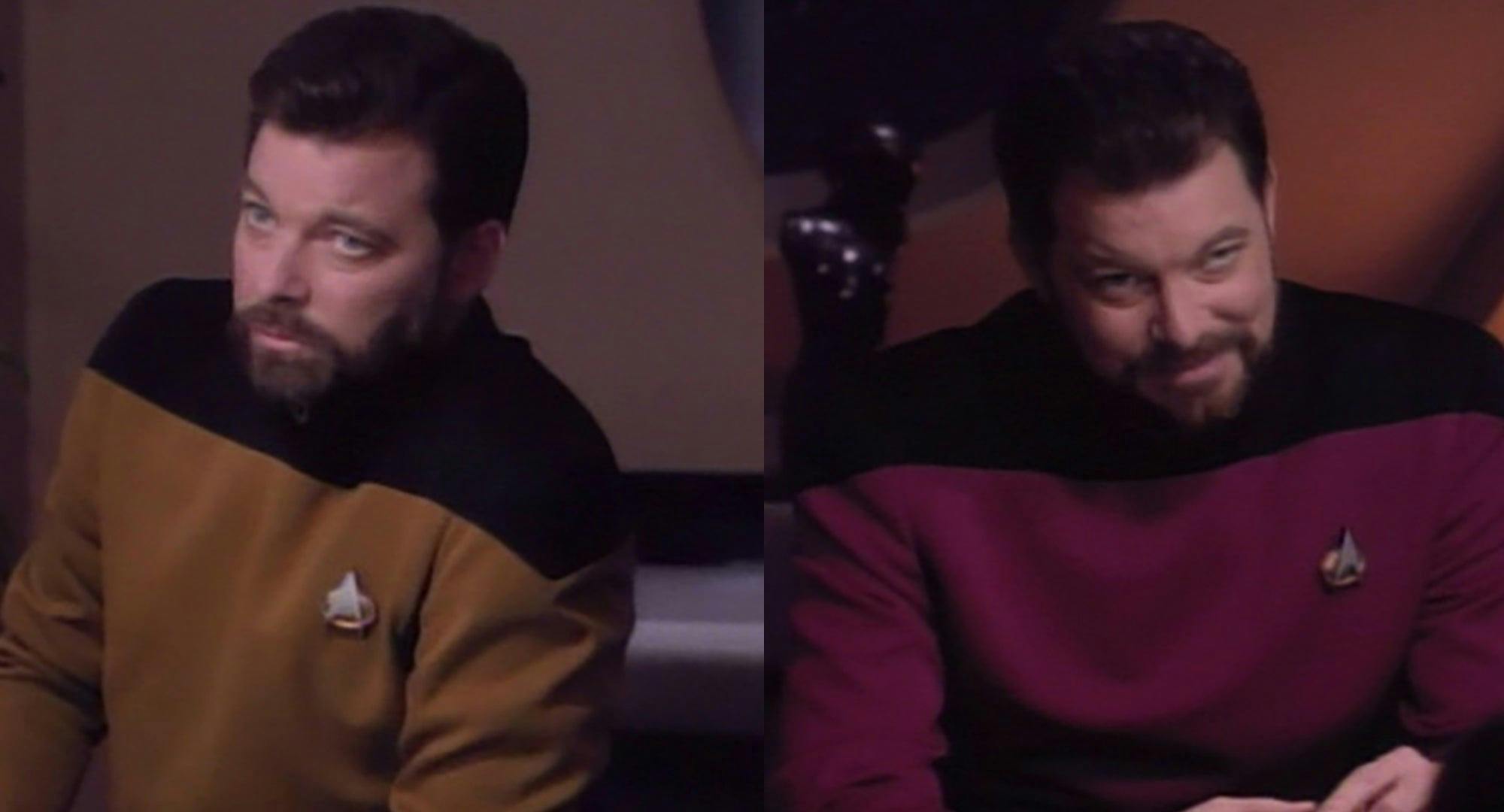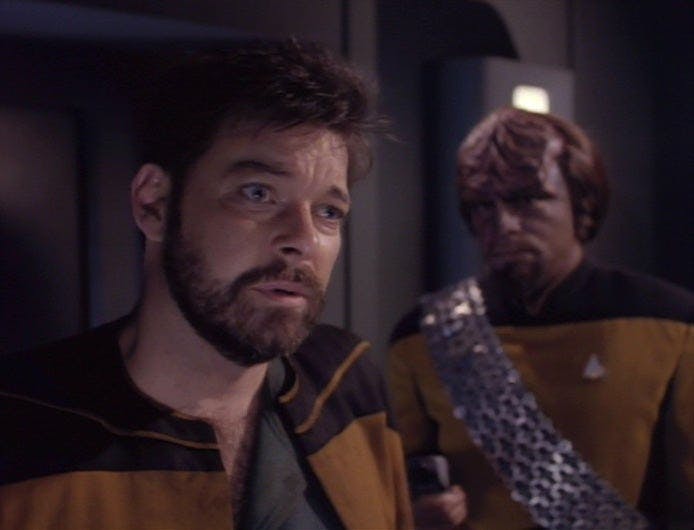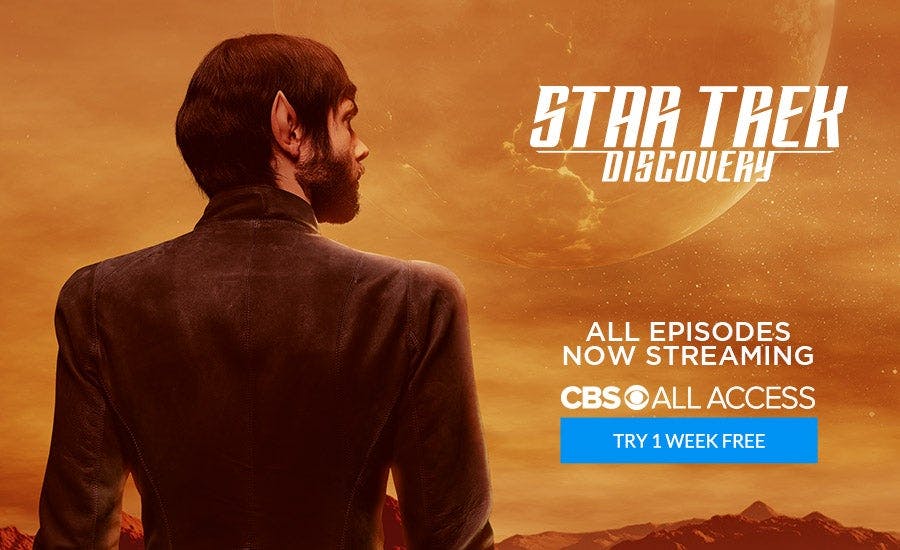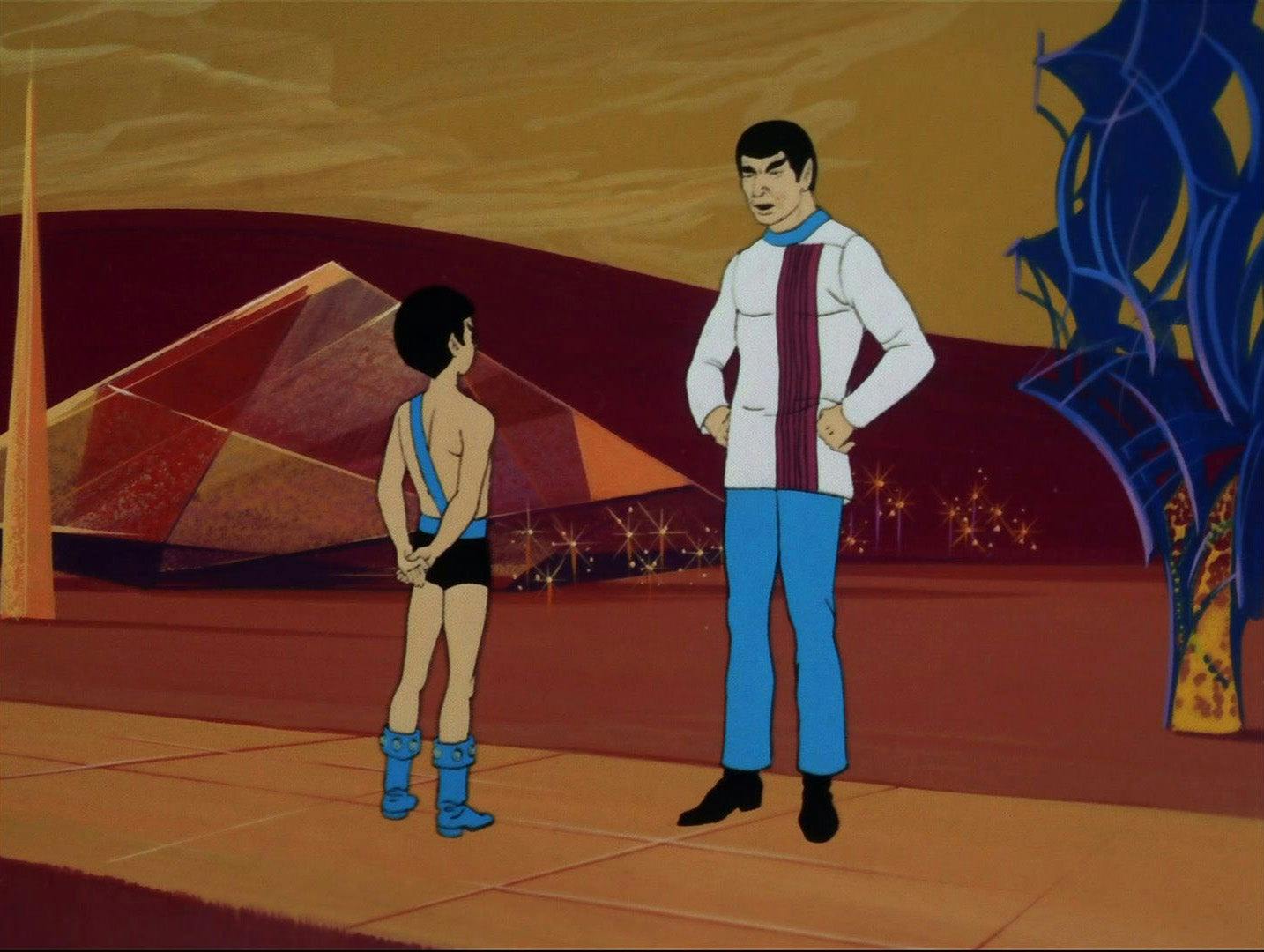Published Aug 7, 2019
Dispatches from #STLV: 'Star Trek' as a Philosophical Thought Experiment
Need help making sense of the paradoxes of transporters, mirror universes, and time travel? We're here for you.

StarTrek.com
A transporter accident in 2361 left then-Lieutenant William Thomas Riker stranded on the uninhabitable planet of Nervala IV, where he would be stranded for eight years until rescued by the U.S.S. Enterprise.
Also in 2361, then-Lieutenant William Thomas Riker was successfully transported off of Nervala IV, allowing him to advance his career over the next eight years until he became commander of the U.S.S. Enterprise.

StarTrek.com
In Star Trek: The Next Generation, both of these statements are true, as seen in the episode “Second Chances.” Commander Riker meets himself — or at least, a version of himself created by a second transporter beam almost a decade earlier and marooned on a rocky wasteland of a planet. Both still-Lieutenant Riker (who by the end of the episode chooses to use his middle name, “Tom,” to distinguish himself from the Enterprise's Executive Officer), and Will Riker, were until the accident, the same person. Both are, in fact, the “real” William Thomas Riker, though both have completely divergent lives and careers. How do we make sense of this, and other, paradoxes written into the Star Trek series?
Philosophy provides some tools to help us make sense of the paradoxes of transporters, mirror universes, and time travel. In the Star Trek Las Vegas 2019 panel “Time Travel, Transporters and the Terran Universe: Philosophy and Star Trek,” Professors Beth Seacord, Kenny Boyce, and Rebecca Chan outline some core philosophical issues raised by Star Trek.
Dr. Erin Macdonald Explains Transporters
Beth Seacord, Assistant Professor of Philosophy at the College of Southern Nevada, explained that when we think about time travel, philosophical understandings of time offer us a helpful framework. It allows us to consider whether time travel is a coherent concept. Put another way, is time travel even logically possible, or are there contradictions that make it impossible? What does “possible” mean, anyway? From the point of view of philosophers, something is “possible” when there is no physical prohibition on its occurrence and no logical prohibition – there are no logical contradictions that render it nonsensical.
Seacord explained that possible objections to time travel include the idea that only the present exists. There might not be a future or a past to travel to! There is also the matter of backward causation: the idea that the causes become the effects rather than the other way around, where effects are a sign of the causes of an event. There’s also the grandfather paradox. Seacord explained that the Red Angel storyline in Season 2 of Discovery is a great example of a storyline that grapples with the inconsistencies that can arise when the past is changed by time travel. Plus, if time travel can alter the past, do we even have free will?

startrek.com
Importantly, Seacord noted, Star Trek is not totally consistent in its theory of time travel across the different series and films in the franchise. This is not necessarily a deficiency: it means that Star Trek repeatedly gives writers and viewers alike an opportunity to consider the philosophical issues that arise with time travel (in addition to the actual physics problem of making it happen).
Behind these difficult questions about cause and effect are basic questions about what time is: is it real, imaginary (all in our heads), or somehow emergent? What is the rate of time’s passage? There are also important questions about whether time travel makes sense at all, and it is here, Seacord noted, that philosophy can make itself useful to physicists. If time travel doesn’t make logical sense, then maybe physicists don’t have to worry about how to build a time machine.

StarTrek.com
Dr. Boyce framed the question of time travel as a matter of personal identity. Who are we, if potentially two versions of us can co-exist at the same time? A packed audience learned that there are a few different ways of addressing this. In the Star Trek: The Animated Series episode “Yesteryear” Spock time travels to his childhood in order to save his younger self from death. Dr. Boyce explained that in this scenario, we have to find a way to make three facts co-exist: 1. At the time of his childhood, Spock is over six feet tall; 2. At the time of his childhood, Spock is not over six feet tall; and 3. There is no time at which the same individual is both over six feet tall and not over six feet tall. This is a personal identity paradox that continues to be a subject of open exploration in philosophical work.
Of course, Discovery has added significant depth to Trek’s relationship with time travel with the Red Angel. Dr. Chan used this plot to think about things beyond our control and how they could have gone differently. Noting that at a Star Trek convention in Las Vegas, nothing could be more appropriate than thinking about luck, Chan then breaks down luck into more types than I ever thought to imagine. Philosophers define “luck” as something that is out of our control. We can be morally lucky, and this type of luck comes with a kind of currency, that of praise and blame. There is also circumstantial luck, which is happening to end up in the circumstances we are in, like where we are born, through no choice of our own.
Whether someone is born in the Prime Universe or the Mirror Universe is completely outside of their control: it is a matter of circumstantial luck. And yet, this luck determines whether Michael Burnham is raised by Vulcans and becomes a moral Starfleet officer, or whether she is raised by the Terran Empress and becomes a calculating killer. There is, some philosophers argue, "too much luck" for us to make reasonable judgments about who deserves praise and who deserves blame. Whether a character in Star Trek — or any of us for that matter — becomes a hero or villain, then, is maybe less about who they are and more about the luck of the draw.
Dr. Chanda Prescod-Weinstein (she/her) is an Assistant Professor of Physics and Astronomy and Core Faculty in Women’s Studies at the University of New Hampshire. Her research focuses on cosmology and particle physics. Find her on twitter @IBJIYONGI.

